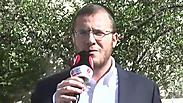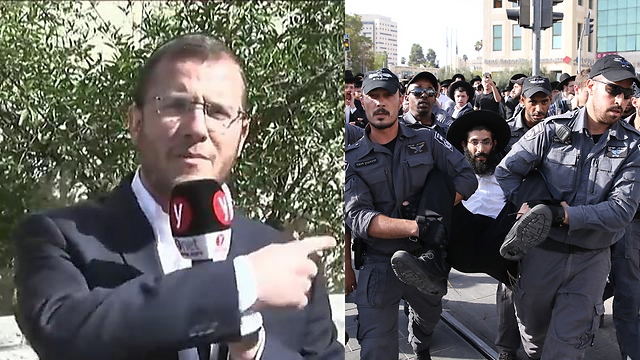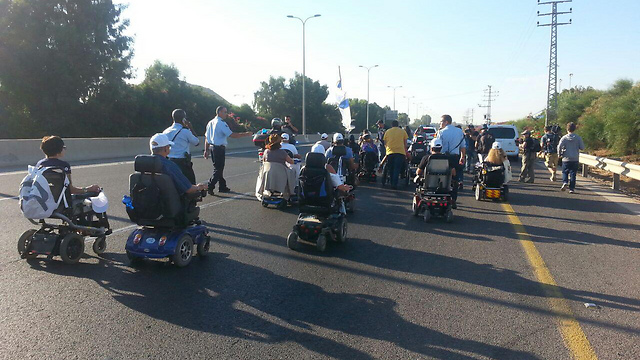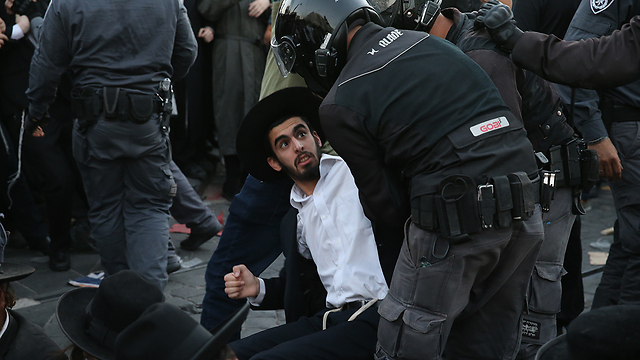
Haredi protest leader: 'We scorn Israel'
After the fifth consecutive day of protests by ultra-Orthodox Jews against army enlistment, Rabbi David Zucker—one of the organizers of the demonstrations—attempts to explain rationale behind their anger; 'We scorn Israel in the strongest possible manner.'
The "Day of Wrath," which was staged by Haredi protesters throughout Thursday at various roads, intersections and highways around Israel, was joied by Rabbi David Zucker, who participated in several demonstrations to show his support for draft-dodgers and his contempt for the IDF.
The rabbi, a member of the "Committee to Save the World of Torah"—the organization that stands behind the demonstrations—reveres the detainee draft-dodgers as "heroes." He refers to the riots as "war" and enlistment in the army as "religious persecution."
This almost militant terminology is buttressed by yeshiva students who go into the so-called battle against the "draft law" and the Supreme Court ruling on quotas, under the command of an 86-year-old elderly rabbi, Shmuel Auerbach.
"As far as we are concerned, going to the army is forced conversion from Judaism," claimed Zucker in an interview with Ynet. "It means selling our souls and the souls of our descendants, and we will fight this with all our strength and with all the means available to us."
The reason for the blocking of the roads and the violent demonstrations that resumed immediately after the holidays ended was the arrest of two Ponevezh yeshiva students who refused to show up at the IDF recruiting center in order to receive the exemption. They joined six more refuseniks, who Zucker lauded as "The Eight Heroes in Prison Four".
"When our heroes are arrested, we go out to fight for them with all our might, to back them up and proclaim to the people and the world: 'We are the sons of the Lord our God, and walk only in the way of Torah and piety,'" said Zucker.
"We are gentle people with no criminal record"
Behind the demonstrations is the Jerusalem Faction, a relatively small group—but one which represents tens of thousands within the Haredi community.They are not represented in the Knesset, but wield public power expressed in the streets and on roads, in protests of what they call "a law aimed at weakening the power of the Torah and harming yeshivot."
"The law of recruiting yeshiva students requires that every year they take a piece of the yeshiva students' living flesh to meet the quotas," Rabbi Zucker as he explained his rationale behind the demonstrations.
"We are not prepared to put up with the whole goal of bringing us to the recruitment office, and there decide who meets the criteria, and who can wait for another six months in the yeshiva (until the next time he has to go to the recruitment office—ed). We are not playing this game. We sit in the Beit Midrash and continue to study the Torah of God."
Rabbi Zucker insists that the demonstrators are "gentle people without a criminal record" and that the violence is only carried out on the part of the security forces and in a discriminatory and "unprecedented" manner.
"What about the disabled? What about the IPBC? What about Haifa Chemicals? Did the police use violence there? Did the police arrest someone?" he asked. "When one of ours was just sitting on the road, he received an extension of detention with very harsh conditions. This is discrimination between people of the same blood."
When the charge was put to Zucker that he and like-minded people make their own judgments and decide who will enlist, how many will enlist and how, and that the message being sent is that they scorn the laws of the State of Israel, he was unequivocal in his response.
"Without doubt," Zucker replied. "We scorn the State of Israel in the strongest possible manner, and we see their hysteria. And that's fine, it's legitimate, it's part of the battle.
"But even the disabled people scorn the state that says you have to live with a certain pension, while they want a different one. The same state rules that Haifa Chemicals is dangerous to the public, but when several hundred workers stand up and cry out, everyone backs them up.
"And what about the ultra-Orthodox public, which for it is 'death before transgression'? Understand, we're not going to give up on that. We're going to fight for it. Why does no one understand that?" he asked.
In their response to Zucker's accusations of police brutality, the police stated that they refrain from using excessive force in any protest, and do not discriminate based on who organizes it.
"These are baseless claims that testify to the violent nature of the demonstrators and not to those who come to maintain public order and protect normal law-abiding citizens," the police said.
"When it comes to violent demonstrations, the Israel Police uses means to disperse disturbances without favoritism to any sector, the subject of the demonstration or the demonstrators themselves, as is appropriate for a democratic state in 2017.
"Those who deem this unpleasant or hurtful should, first of all, do everything in order to avoid delinquency and arrest and to not violate the law time after time.
"The Israel Police will continue to allow freedom of speech and protest to every person in Israel, but will not allow violent riots, blockades, attacks against officers or any other illegal act that violates the law."
Attila Somfalvi, Alexandra Lukash and Eliezer Hayun contributed to this article.














